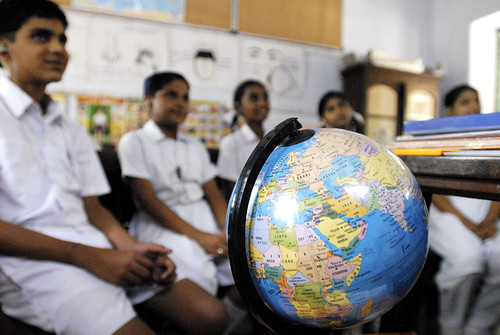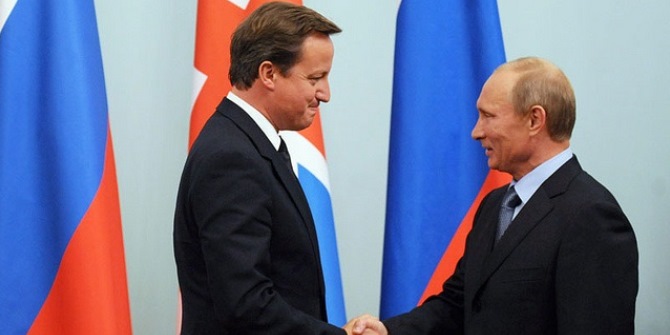 The UK and other donor countries spend considerable time and resources advising developing countries how to improve government performance. But monitoring what then happens on the ground is costly and, in the case of the UK’s Department for International Development, it has not been strikingly effective. LSE’s Stephen Kosack explores how local organizations in recipient countries can often be far more effective at monitoring government performance and advocating for improvements.
The UK and other donor countries spend considerable time and resources advising developing countries how to improve government performance. But monitoring what then happens on the ground is costly and, in the case of the UK’s Department for International Development, it has not been strikingly effective. LSE’s Stephen Kosack explores how local organizations in recipient countries can often be far more effective at monitoring government performance and advocating for improvements.
In 2008 the UK spent £8bn on Overseas Development Assistance (ODA), making it the 5th largest donor worldwide after the US, Japan, Germany, and France, and ahead of the Netherlands, Sweden, and Canada. This laudable commitment looks set to continue—along with the NHS, the foreign aid budget was one of only two spending areas ring-fenced from budget cuts in last week’s coalition budget.
But as the UK contemplates many years of fiscal austerity, value for money will be a recurrent theme. With foreign aid, this is tricky, as aid’s effectiveness generally depends on the recipient government—on its priorities and its capacity. Like many donors, the UK is increasingly recognizing this. Since 2003, it has nearly doubled the aid it delivers as budget support, from £268 million to £461 million. This support flows directly to the coffers of governments whose priorities the UK approves of—countries like India, Ghana, Uganda, and Vietnam. (See DfID’s 2004 white paper on the benefits of budget support.)

Where the UK and other donors struggle is in building the capacity of these governments. A 2008 NAO report, for example, found that while budget support has generally allowed them to provide more essential services (such as health and education), it is more vulnerable to corruption, as it removes DfID’s ability to track contributions individually; instead DfID can only monitor the recipient government’s expenditures and its progress against its agreed development strategy, which is often nebulous and hard to quantify.
We need a new approach to monitoring and improving the performance of recipient governments. In a new book, From the Ground Up, my coauthors and I start with a simple idea. No one is better placed to judge a government than those it governs. And no one is better positioned to monitor government services to ensure that they perform well and transparently than the citizens who use those services.
This idea leads to a very different model of assistance than the one that has recently been dominant. Instead of, or alongside, traditional donor auditing—by bodies such as the World Bank, DfID, or the coalition government’s new independent Aid Watchdog—money may be better spent directly supporting local independent monitoring organizations, who have the local knowledge to much more easily discern problems and design solutions with government service delivery.
This grassroots model has been piloted over the last few years by the Transparency and Accountability Program at the Results for Development Institute in Washington (R4D). The Transparency and Accountability Program gives small grants directly to small research organizations in developing countries. The grants fund researchers as they investigate the particular problems with how the government provides education and health care in their communities, design feasible solutions to those problems, and then try to persuade the government to implement their solutions. R4D’s assistance is minimal; outside of the small grants, which average $45,000 for a nine-month project, all it provides is a small amount of technical training and assistance, and the opportunity to learn from other organizations doing similar work in peer learning sessions.
The programme is still in its early days, and has not yet been through the kind of rigorous, randomized impact evaluation that would permit a causal conclusion. But the results of the first two rounds of grants, covering 39 studies in 21 countries, show tremendous promise. Examples include:
- An organization in Guatemala called Centro de Investigaciones Económicas Nacionales (CIEN) studied delays in the delivery of textbooks and supplies reaching classrooms—sometimes months late—and used that information to persuade the government to change the school calendar year so that students would have books and school lunches on the first day of class, not the 100th.
- The Ghana Center for Democratic Development (CDD) found that teacher absenteeism rose dramatically on Fridays in large part because training programs were scheduled on that day, often at locations hours from home. Both sides are now working toward a solution to reschedule the training programs so that they no longer disrupt class.
- In Paraguay, Centro de Analisis y Difusion de la Economia Paraguaya (CADEP) documented a troubling lack of transparency among public school budgets and effectively made the case that parent organizations were the only independent group capable of being an outside monitor of the funds; the government reacted by starting a program in roughly two-thirds of the nation’s schools to train parents to be better overseers.
- And in two districts in the state of Karnataka in India, which has a population of 53 million, the Indo-Dutch Project Management Society (IDPMS) found that 24 percent of all positions were vacant at public health centers, including half of the pharmacy jobs. They also found that common drugs were not available in health clinics for six to eight months at a time, and doctors were not available for 37 percent of the time during clinic hours. In some cases, the investigators said in interviews, unqualified people were disbursing drugs because no pharmacist was available.
With each of these examples, the researchers’ advantage was local knowledge. They had a head start in assessing the government because they are also citizens. They live with the government; they use its services and pay for them with their taxes. They therefore began their work already possessing a sense of what government services are working well or poorly. This experience helped them frame manageable studies, and provided them with an invaluable personal commitment to developing and advocating for feasible reforms that produced real improvements in government services.
As DfID and other donors try to get the most out of their aid, they should consider devoting more of their assistance to the local researchers who can most effectively judge government performance.
Stephen Kosack and co-authors from Research for Development and the World Bank have recently published From the Ground Up: Improving Government Performance with Independent Monitoring Organizations.
Or Google Books version here.: http://books.google.com/books?id=ETGVeEFFuMAC&printsec=frontcover&dq=from+the+ground+up:+improving+govenrment&hl=en&ei=ob4oTIi0LMuTsQa8opDEBA&sa=X&oi=book_result&ct=result&resnum=1&ved=0CCwQ6AEwAA#v=onepage&q&f=false





